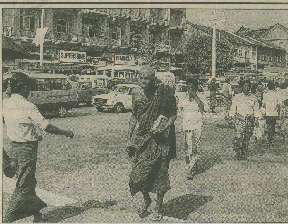By Michael Dobbs-Higginson
TIME out, as the Americans say. Sensationalist cries that Ms Aung Sang Suu Kyi, the Nobel Peace Prize winner is another Nelson Mandela or Bernizir Bhutto must be tempered with reason. Quite clearly she is a remarkable woman and her six- year refusal to be . released from house detention on condition. that she left Myanmar is to be greatly admired.
